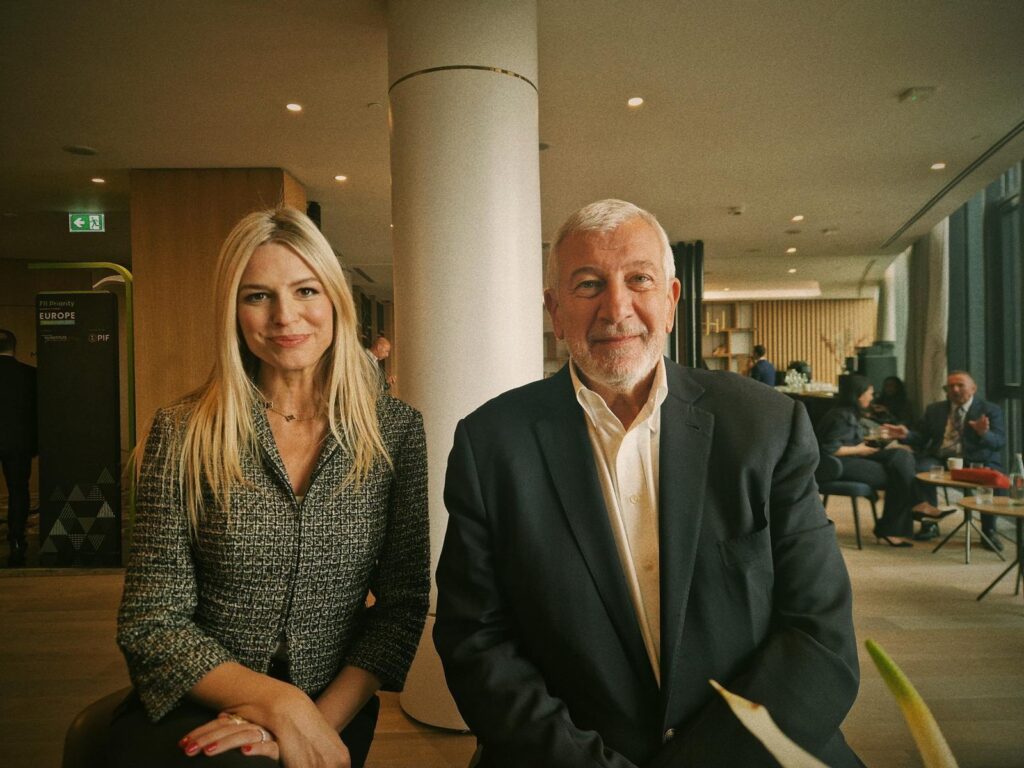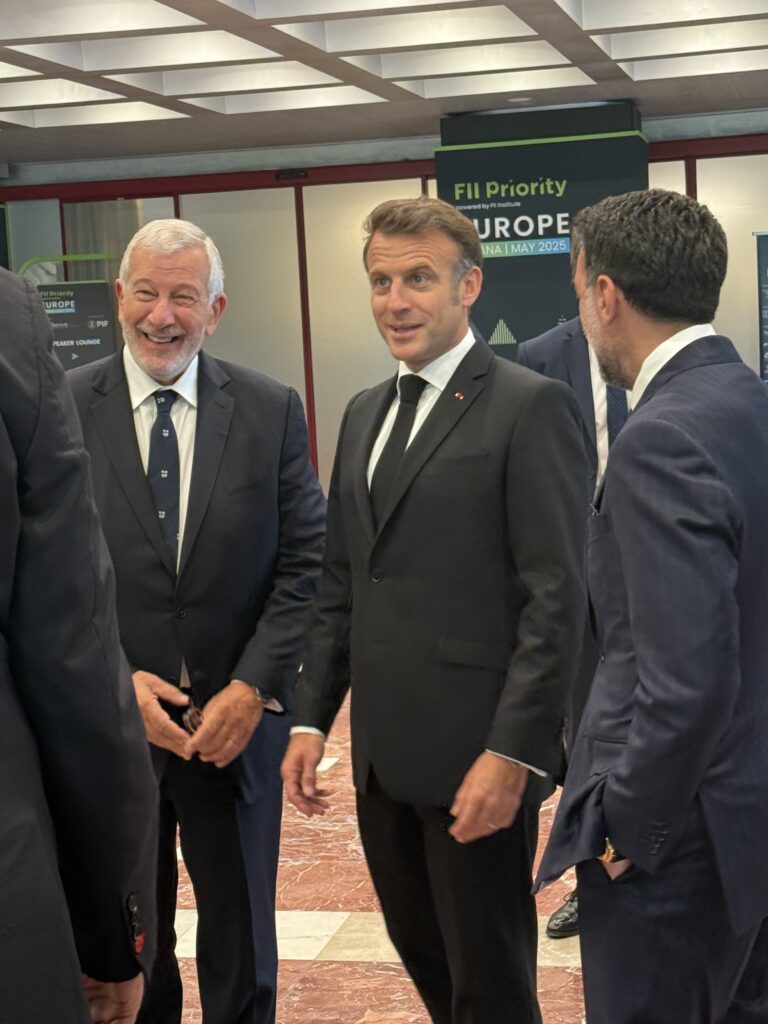From Tirana to the global stage: why Southeast Europe may hold the key to the continent’s investment revival and strategic renewal
 TALKS
TALKS
by Ana Blanquart
Richard Attias, Executive Chairman of the Future Investment Initiative Institute – owned by one of the world’s most valuable sovereign funds, Saudi Arabia’s Public Investment Fund (PIF) – speaks exclusively to Diplomacy&Commerce about the summit that brought together global investors alongside French President Emmanuel Macron and Albanian Prime Minister Edi Rama.
“The Balkans are a region we need to take seriously. In the past few months, as I’ve visited several countries there, it has become clear to me that this small corner of Europe is emerging as a new winner when it comes to investment,” says Attias. “There is enormous talent here, and it’s crucial to create platforms that allow them to show what they’re capable of.”
Over 600 global investors, policymakers, and business leaders participated in the two-day summit, which focused on connecting European innovation with international capital. The event marked the first European edition of the FII Summit, expanding on what is already the world’s largest investment conference, held annually in Riyadh and regularly attracting top executives from the world’s biggest companies.
Spin-off editions of the summit are held worldwide each year. In Rio de Janeiro, the conference was opened by Brazilian President Lula, while in Miami, then newly elected President Donald Trump famously told attendees that the golden era of the United States was beginning.
The European edition of the summit, held in May this year in Tirana, came at a pivotal – and somewhat unusual – geo-economic moment, shaped by disrupted trade flows, shifting global alliances, and the mounting urgency of the energy transition.
CEOs of major global corporations and investment funds – including Yasir Al-Rumayyan, Governor of Saudi Arabia’s PIF; former Italian Prime Minister Matteo Renzi; EMAAR founder Mohamed Alabbar; Sir Noel Quinn, until recently Group CEO of HSBC; and Jared Cohen from Goldman Sachs – gathered to discuss investment prospects across Europe and the urgent steps needed for the continent to move beyond its current geo-economic status quo and re-establish itself as a hub of innovation and capital.
What message is the FII Institute hoping to send by organising this summit in Tirana?
It’s essential to understand that FII is a global organisation. The conversation cannot be limited to Saudi Arabia, where we were born, or the United States, where we’ve already hosted summits in New York and Miami – or even Asia. Europe, Africa and Latin America are part of our shared humanity, and if you want to have a meaningful impact on society, you need to be present everywhere.
The timing of the first European summit coincided with the EPC meeting, which brought together 47 European leaders in Tirana. “What we try to do,” he adds, “is to host conversations in the right place at the right time.”
The FII Institute is sending a clear and deliberate message: the future of Europe isn’t confined to its traditional centres. “We’re spotlighting Southeast Europe as a new frontier of opportunity – a gateway for investment, innovation and diplomacy,” Attias explains. “Tirana represents a Europe that is dynamic, open to transformation, and ready to take a proactive role in shaping global priorities.

You’re surrounded by some of the world’s top business leaders. What’s the mood among them when it comes to investing in Europe?
Great question! (Attias smiles). Europe needs to speak more loudly about the glass being half full, rather than continually focusing on the idea that it’s half empty. There is a perception that Europe isn’t part of the global conversation. Meanwhile, the Global South is becoming more vocal, the US is highly active on the global stage, and Asia stands as one of the two superpowers alongside the US.
Tirana represents a Europe that is dynamic, open to transformation, and ready to take a proactive role in shaping global priorities
For Europe, it’s vital to demonstrate that it offers opportunities on a global scale, not just via individual countries, but as a continent. I’ve personally spent over 25 years of my life here, and I know Europe has so much to offer: creativity, innovation, and strength across many sectors – not just tourism.”
“Forgive me if I sound provocative, but we need to stop calling certain countries ‘beautiful museums’. Let’s showcase the creativity, innovation, and potential that exist across Europe. This is our oldest continent, and it still has so much to give. In both geo-economic and geopolitical terms, Europe must be at the heart of the global dialogue.
What could be the tangible impact of bringing global capital into Europe?
I believe global capital can support what many European countries need most – the diversification of their economies. That brings in foreign investment, which creates jobs and fuels a virtuous cycle, turning a country into a brand. And when a country becomes a brand, it becomes attractive to investors.”
“Right now, the perception of many European countries is one of high taxes, heavy bureaucracy, and a business-unfriendly environment. That perception must change. Over the past two years, foreign investment in Europe has declined significantly, so European leaders must place a greater focus on creating business-friendly frameworks, not just through words, but through concrete action.
Can capital help bridge the divisions in today’s world, especially given recent global tensions?
Absolutely. When directed with a clear sense of purpose, capital can bridge divides, create opportunities, and foster collaboration where politics often falls short.”
The world we live in today needs more than dialogue – it requires real engagement and investment aligned with shared interests and mutual benefit. At FII Institute, we believe that responsible investment can be a unifying force, helping to build ecosystems of trust, innovation and resilience.
How do you see Europe shaping its role amid the shifts in US economic policy?
Europe today has both an opportunity and a responsibility to strengthen its strategic autonomy. As the United States leans towards protectionism and reshoring production, Europe must double down on its core strengths: innovation, sustainability and values-based governance.”
By embracing green technologies, digital transformation and global partnerships, Europe can step into a leadership role – not by competing with the US, but by complementing it and collaborating within a new multipolar economic order.
In February, you organised the summit in Miami, opened by Donald Trump, marking a new chapter in Saudi–US relations. What do you expect from this summit with President Emmanuel Macron?
We are living in an era of partnership between the public and private sectors. President Trump didn’t choose FII Miami by chance – just a month after taking office, he wanted to address the global business community. We had over 1,500 CEOs in the room, and he spoke for nearly an hour and a half about what the US had to offer. It was a pivotal moment for establishing trust between the new US leadership and the international business community.
I hope this European summit will achieve something similar – that President Macron’s address to the global business community will send a clear signal that Europe is ready for positive change.
We need to stop calling certain countries ‘beautiful museums’ and showcase the creativity, innovation, and potential that exist across Europe
This summit, which featured both President Macron and Prime Minister Rama, marks a notable European awakening. While Miami signalled a strategic deepening of ties between Saudi Arabia and the United States, Tirana represents a re-engagement with Europe. The outcome we’re hoping for is a more precise roadmap showing how Europe can reposition itself within the new global order – by attracting fresh capital, strengthening cross-continental alliances and taking a more assertive role in economic diplomacy. With leaders like Macron and Rama, this isn’t just a conversation – it’s a call to action.
I also hope international investors will begin to see Europe as a desirable place to invest. What they’re looking for is political stability, strong leadership, and opportunities that promise solid returns.
Why the Balkans?
Personally, after spending several months here, I’ve come to see this small part of Europe as a leading contender in the new economy. Many of these countries remain under the radar – not much is said about them, and yet they are reservoirs of talent, especially in technology and artificial intelligence.
You mentioned the Balkans as potential new winners. Which sectors do you think will lead the way?
Healthcare, biotechnology and artificial intelligence – especially when it comes to application, not just the underlying tech. I believe we’ll see some unexpected companies emerging over the next five years, becoming the next Meta, Amazon or Tesla.
Think about it – ten years ago, many of today’s biggest companies didn’t even exist. Therefore, we need to remain open and prepare for the emergence of new winners we are not yet aware of.
For Europe, I would love to see some of those winners come from here. Others will undoubtedly come from Asia and, once again, from the US – but I also hope that Africa and Latin America get a seat at the table. That’s what a truly global world should look like.